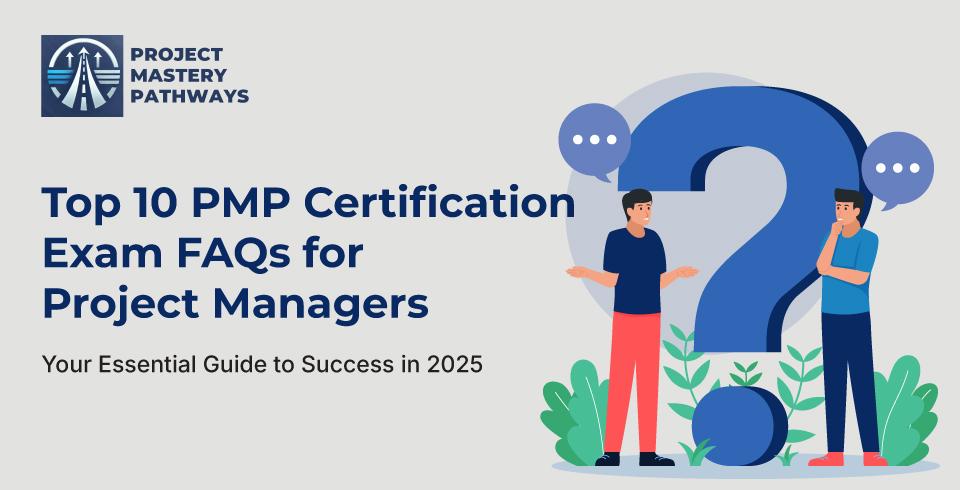Are you considering pursuing the Project Management Professional (PMP) certification but feeling overwhelmed by the numerous questions swirling in your mind? You’re not alone. Every aspiring project manager faces the same uncertainty when contemplating this prestigious certification. The PMP exam can seem daunting, with its complex eligibility requirements, evolving format, and substantial investment of time and money. However, armed with the right information and clarity on the most commonly asked questions, you can approach your PMP certification journey with confidence and strategic preparation.
This comprehensive guide addresses the top 10 frequently asked questions about the PMP certification exam, providing you with current, accurate information based on 2025 standards. By the end of this article, you’ll have a clear roadmap to navigate the PMP certification process and make informed decisions about your project management career advancement.
What is PMP Certification and Why Should I Pursue It?
The Project Management Professional (PMP) certification is the gold standard credential in project management, administered by the Project Management Institute (PMI). This globally recognized certification validates your expertise in leading and directing projects, demonstrating your ability to apply project management principles across various industries and methodologies.
The PMP certification demonstrates that you have specific experience and dedication to your field, which makes you eligible for more senior positions, often with better pay. According to PMI, PMP certification holders earn 32% more than their non-certified peers, making it a valuable investment in your career growth.
The certification covers three key performance domains that reflect modern project management practices: People (42% of exam questions), Process (50% of exam questions), and Business Environment (8% of exam questions). This structure ensures you develop comprehensive skills in leadership, technical project management, and strategic business alignment.
What Are the PMP Certification Eligibility Requirements?
Before you can take the PMP exam, you must meet specific education and experience requirements. PMI has established two pathways to qualification:
Pathway 1: Bachelor’s Degree or Higher
- Four-year degree (bachelor’s or global equivalent)
- Minimum 36 months (3 years) of project management experience
- 4,500 hours of leading and directing projects
- 35 hours of project management education/training
Pathway 2: High School Diploma or Associate Degree
- High school diploma, associate degree, or global equivalent
- Minimum 60 months (5 years) of project management experience
- 7,500 hours of leading and directing projects
- 35 hours of project management education/training
The experiences mentioned by you in your application should cover all the five processes mentioned in the PMBOK Guide. But you should keep in mind that it is not necessary for all of these processes to be in one single project. Your project management experience can come from various sources, including volunteer work, freelance projects, and professional employment.
How Much Does the PMP Exam Cost?
Understanding the financial investment required for PMP certification is crucial for planning your certification journey. The costs vary significantly based on your PMI membership status.
2025 PMP Exam Fees:
- PMI Members: $405 USD (plus $129 annual membership fee + $10 application fee)
- Non-PMI Members: $555 USD (increasing to $675 USD effective August 6, 2025)
Starting on 6 August 2025, the Project Management Professional (PMP) certification exam fee will undergo a price adjustment for non-members of PMI (Project Management Institute). In the United States: The PMP exam fee for non-members will increase from $595 to $675 USD.
Additional Costs to Consider:
- PMI membership: $129 annually (highly recommended for cost savings)
- Study materials: $50-$200
- Training courses: $1,000-$2,000 for instructor-led programs
- Retake fees: $275 (members) or $375 (non-members)
Pro Tip: Becoming a PMI member before taking the exam can save you money, as the membership fee plus member exam fee is often less than the non-member exam fee alone.
What is the PMP Certification Exam Format and Structure?
The PMP exam has undergone significant changes to reflect modern project management practices. The exam consists of 180 questions. Questions will be a combination of multiple-choice, multiple responses, matching, hotspot, and limited fill-in-the-blank.
Current PMP Exam Structure:
- Total Questions: 180 (175 scored + 5 unscored pretest questions)
- Duration: 230 minutes (3 hours and 50 minutes)
- Question Types: Multiple-choice, multiple-response, matching, hotspot, fill-in-the-blank
- Breaks: Two optional 10-minute breaks
Domain Distribution:
- People Domain: 42% (~76 questions) – Leadership, team management, stakeholder engagement
- Process Domain: 50% (~90 questions) – Technical project management processes
- Business Environment Domain: 8% (~14 questions) – Strategic alignment and governance
About 50% of the questions are based on predictive project management methodologies and rest 50% come from agile and hybrid methodologies. This balanced approach ensures you’re prepared for today’s diverse project management landscape.
How Long Should I Study for the PMP Exam?
The study duration for the PMP exam varies based on your experience level, available time, and learning style. Most candidates require 3-6 months of dedicated preparation.
Recommended Study Timeline:
- Experienced PMs: 3-4 months with 2-3 hours daily study
- New PMs: 4-6 months with 3-4 hours daily study
- Career Changers: 6+ months with intensive study schedule
Effective Study Approach:
- Foundation Phase (4-6 weeks): Master PMBOK Guide concepts and terminology
- Application Phase (6-8 weeks): Practice scenario-based questions and case studies
- Intensive Practice Phase (2-4 weeks): Complete multiple mock exams and identify weak areas
- Review Phase (1-2 weeks): Final revision and confidence building
Consistency is key to success. Understanding this structure is fundamental to developing your time management strategy, as you’ll need to allocate approximately 1.3 minutes per question to complete the exam comfortably.
What is the PMP Exam Passing Score?
PMI doesn’t publish a specific passing score for the PMP Certification exam. Instead, they use a psychometric analysis to determine pass/fail results. While 60% is often cited, aiming higher is recommended due to the exam’s complexity and emphasis on applied knowledge and scenario-based decision-making.
Performance Reporting: Your exam results are reported as:
- Above Target: Strong performance in this domain
- Target: Adequate performance meeting requirements
- Below Target: Performance below expectations
Success Strategy: Rather than focusing on a specific percentage, aim for comprehensive understanding across all three domains. PMI evaluates your ability to apply project management knowledge in real-world scenarios, making deep conceptual understanding more valuable than memorization.
How Many Times Can I Retake the PMP Exam?
If you don’t pass on your first attempt, you have multiple opportunities to succeed. The candidate has up to three attempts to pass the exam within 1 year.
Retake Policy:
- Total Attempts: Up to 3 attempts within one year of approval
- Waiting Period: No waiting period between attempts
- After Third Failure: Must wait one year before reapplying
Retake Fees:
- PMI Members: $275 per retake
- Non-Members: $375 per retake
Important Note: If you fail the examination three times within your one-year eligibility period, you must wait one year from the date of the last examination you took to reapply for the certification.
To maximize your chances of first-time success, consider comprehensive preparation including quality study materials, practice exams, and structured learning approaches that you can find in specialized PMP certification courses.
How Long is PMP Certification Valid?
PMP certification is valid for three years from the date you pass the exam. PMP certification holders are required to earn 60 professional development units (PDUs) in each 3-year cycle to maintain a PMP certification.
Certification Lifecycle:
- Active Status: Valid for 3 years from certification date
- Renewal Requirements: 60 PDUs every 3 years
- Renewal Fee: $60 (members) or $150 (non-members)
PDU Requirements Breakdown:
- Education PDUs: Minimum 35 PDUs (no maximum)
- Giving Back PDUs: Maximum 25 PDUs (optional)
- PMI Talent Triangle Distribution: Minimum 8 PDUs each in Ways of Working, Power Skills, and Business Acumen
The PMI PDU requirements mandate 60 PDUs every three years, split into two categories: Education PDUs (Minimum 35 PDUs, no maximum): Focus on learning aligned with the PMI Talent Triangle—Ways of Working, Power Skills, and Business Acumen.
What Study Materials Do I Need for PMP Exam Preparation?
Effective PMP exam preparation requires a combination of official PMI resources and supplementary study materials. Here’s a comprehensive list of recommended resources:
Essential Study Materials:
- PMBOK Guide 7th Edition: The foundation document for project management principles
- Agile Practice Guide: Essential for understanding agile methodologies
- PMI Authorized Training: 35 contact hours from PMI-approved providers
- Practice Exams: Multiple full-length simulators with detailed explanations
Recommended Study Resources:
- Official PMI Study Materials and online courses
- PMI-authorized training partner courses
- Quality practice exam simulators with scenario-based questions
- Study groups and online forums for peer support
Study Strategy Tips: Focus on understanding concepts rather than memorization. You can assume that 90% of questions in the exam are situational questions. This means you need to develop strong analytical skills to apply project management principles to real-world scenarios.
For comprehensive preparation, consider exploring proven study resources and training programs that align with current exam requirements. You can find detailed guidance on effective study strategies in our Complete Guide to PMP Exam Success.
Can I Take the PMP Exam Online?
Yes, PMI offers flexible testing options to accommodate different preferences and circumstances. You can choose between:
Computer-Based Testing (CBT):
- Available at Pearson VUE testing centers worldwide
- Proctored environment with standard testing conditions
- Scheduled at your convenience based on availability

Online Proctored Testing:
- Take the exam from your home or office
- Requires stable internet connection and compatible computer
- Real-time proctoring via webcam and screen sharing
- Strict environmental requirements (quiet, private space)
Paper-Based Testing:
- Limited availability for remote locations
- Paper-based testing is available only for candidates who live at least 300 km from the nearest Prometric center or have difficulty crossing their country’s borders.
Both online and center-based testing offer the same exam content and difficulty level. Choose the option that best suits your comfort level and testing environment preferences.
Taking the Next Step in Your PMP Journey
Pursuing PMP certification is a significant career investment that can open doors to higher-paying positions and increased professional recognition. With over one million PMP-certified professionals worldwide, joining this elite community demonstrates your commitment to excellence in project management.
The key to PMP success lies in thorough preparation, understanding the exam format, and developing strong analytical skills for scenario-based questions. Remember that the exam tests your ability to apply project management principles in real-world situations, not just memorize definitions and formulas.
As you embark on your PMP certification journey, consider leveraging comprehensive study resources and expert guidance to maximize your chances of first-time success. The investment in quality preparation materials and structured learning approaches will pay dividends in your exam performance and long-term career growth.
Ready to take your project management career to the next level? Follow PMPwithRay for comprehensive exam preparation tips, study strategies, and insights from experienced project management professionals. For structured, comprehensive preparation, explore detailed PMP certification courses on Udemy designed specifically for aspiring project managers who want to achieve first-time success on their PMP certification exam.
Your journey to PMP certification success starts with the right preparation and expert guidance. Take the first step today and join the ranks of certified project management professionals who are shaping the future of project delivery across industries worldwide.

